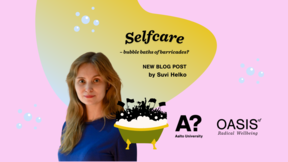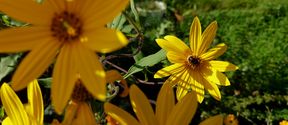Oasis of Radical Wellbeing
Social sustainability in practice.

For many of us, the word self-care suggests different ways of pampering yourself, such as bubble baths and scented candles. Such means are, however, only quick fixes to exhaustion, stress, or unhappiness. While burning scented candles or incense may remove an unpleasant smell (or feeling) momentarily, the only long-term solution is finding out the underlying cause of the smell or feeling. True holistic change can only happen when you identify and remedy the root problem rather than simply alleviate the symptoms.
So what should self-care be about, if not bubble baths and scented candles? Wellbeing here includes enhancing your time management and stress management skills. It means protecting your boundaries, having self-compassion and learning how to identify and read your emotions. Such skills make it easier to have control over your daily life lead a value-based life. For example, when you look at your bank account, have you used your money in line with your values, and when you look at your calendar, is the way you use your time aligned with your values?
In its Finnish Student Health and Wellbeing Survey, conducted in 2021, the Finnish Institute for Health and Welfare (THL) found that the feeling of belonging among university students had suffered during the pandemic due to remote studying. How well-suited, then, is the concept of radical wellbeing for Aalto University?
The American author Audre Lorde (1934–1992) described the term ‘radical selfcare’ as follows: ‘Caring for myself is not self-indulgence, it is self-preservation, and that is an act of political warfare.’ In other words, Lorde saw self-care as a necessity for advocating for social issues close to one’s heart, which for Lorde included feminism, antiracism, and the rights of sexual minorities. Her idea makes sense. After all, even on an airplane, you are advised to put the oxygen mask on yourself first before helping others.
In the Aalto Oasis of Radical Wellbeing project, we see radical wellbeing as the glue that joins the wellbeing of the individual to that of society. Aalto University offers many wellbeing services for individuals, for instance, study psychologists, Starting Point of Wellbeing workshops, and Personal Impact courses. Students who feel well are more likely to have the energy to work towards a better world through different channels in society, such as student organisations, political organisations for young people or voluntary work.
Working for a cause at the social level promotes wellbeing at the individual level: when you as a member of a community can contribute to social causes in ways that are in line with your values, you get a sense of purpose and togetherness. At the same time, your contribution empowers the community, because the power of people working together can influence societal structures. Such structural changes in turn, may have a positive impact on the everyday life of the individual, which creates a positive cycle between the individual and the community.
The problem is, however, that often people battling depression, exhaustion or stress lack the resources or energy to look for a community that would help get the positive cycle going for them. That’s why it is key for student organisations, associations, guilds, and other voluntary organisations to have information readily available and be easily approachable to new people.
This is where the Oasis of Radical Wellbeing comes in. We want to help people find meaningful communities by organising events and using social media – follow @aaltowellbeing on Instagram, TikTok and Facebook – to spread information about workshops and other community-building activities. We also train the Aalto staff on community building because we know that even slight structural changes can have a major impact on the daily life of individual students. For instance, the teacher deciding the group division among their students makes it easier for the students to network and find new friends among their peers.
The autumn is a good time to get involved in voluntary work, because many organisations and associations are looking to recruit new members. For a list of associations and subject associations at Aalto, see the Aalto University Student Union (AYY) website. Other channels of volunteering include the Finnish Red Cross, where you can volunteer to work with, for example, immigrants or elderly people, the Mannerheim League for Child Welfare, which offers various possibilities for voluntary work, such as work as a club leader, and MIELI Mental Health Finland, where persons over 25 can work as volunteers on MIELI’s Crisis Helpline or Sekaisin chat service. You can join a local chapter of the Finnish Association for Nature Conservation (FANC) to organise trips, events and work parties, while with Save the Children you can become a support person for a child or young person, provided you are over 20 years of age. Nyyti ry allows you to promote students’ mental wellbeing through social media or as a peer mentor for an online group. You can search online for more voluntary work organisations and channels.
Could any of the above projects or communities be a good fit for you? Did they get you thinking on how we could help create a positive cycle of wellbeing between the individual and community and help people find their way to purposeful, community-building activities at Aalto University? If yes, please write to the Oasis team at wellbeing-oasis@aalto.fi, because we would love to hear your ideas.

Social sustainability in practice.